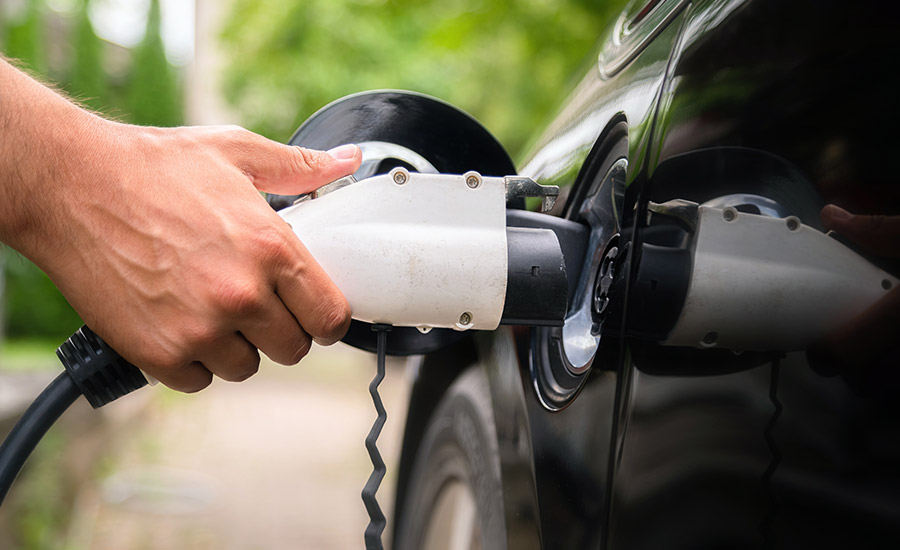
Automotive Industries interview with Max VanRaaphorst, Business Development Manager, E Mobility and Automotive, Avery Dennison
In the rapidly evolving world of electric vehicles (EVs), safety, performance, and efficiency are paramount. Avery Dennison, a global leader in materials science and manufacturing, is at the forefront of innovation in this space. Their new pressure-sensitive adhesive tapes designed for EV battery cell wrapping applications exemplify their commitment to advancing technology while meeting the stringent demands of the automotive industry.
In this exclusive Automotive Industries interview Max VanRaaphorst, Business Development Manager for E Mobility and Automotive at Avery Dennison, shares insights into these groundbreaking products. He explains that prismatic battery cells require a dielectric barrier to prevent arcing, a critical safety feature. Avery Dennison’s dielectric cell wrap tape not only provides instant electrical insulation but also boasts excellent aging resistance and mechanical properties, ensuring longevity and reliability throughout the battery’s life.
These tapes are incredibly thin, which is a significant advantage in the compact spaces of EV batteries. This allows for more room for additional batteries or performance materials, contributing to better overall vehicle performance. Furthermore, the tapes offer excellent electrical insulation and corrosion resistance, vital for the durability and safety of EV batteries.
Avery Dennison’s global footprint and vertically integrated operations enhance their ability to design, produce, and distribute these innovative adhesive solutions efficiently. Their expertise in material science and process technology enables the creation of unique, high-performance products that meet the diverse needs of automotive manufacturers worldwide.
As VanRaaphorst highlights, the evolution of Avery Dennison’s pressure-sensitive adhesive tapes over the past 50 years showcases their dedication to solving complex challenges in vehicle construction. Their solutions not only enhance safety and performance but also drive cost-effectiveness, making them a valuable partner in the transition to electric mobility.
Automotive Industries interview with Max VanRaaphorst, Business Development Manager, E Mobility and Automotive, Avery Dennison
Automotive Industries: Hi Max, can you elaborate on the specific features of Avery Dennison’s new pressure-sensitive adhesive tapes designed for EV battery cell wrapping applications?
VanRaaphorst: Prismatic battery cells require a dielectric barrier to prevent arcing. Avery Dennison have created a dielectric cell wrap tape that has high performance, good aging resistance and leverages our economies of scale.
Automotive Industries: How do these adhesive tapes help in mitigating electrical arcing challenges in EV batteries?
VanRaaphorst: Not only do these tapes provide instant electrical insulation, but have excellent aging resistance and mechanical properties to provide electrical insulation for the life of the battery.
Automotive Industries: What role do these tapes play in providing electrical insulation and corrosion resistance in EV batteries?
VanRaaphorst: Tapes are playing an increasing role in electric vehicles as they provide excellent electrical insulation, while be very thin and taking up little space. This allows for more room for batteries or other performance materials.
Automotive Industries: How does Avery Dennison ensure that the adhesive tapes maintain aesthetic standards while being functional?
VanRaaphorst: For high volume manufacturing having color contrast for vision systems is important to ensure quality. Many manufacturers also conduct hipot tests to verify complete electrical isolation. We help by ensuring the right materials and maintaining tight dimensional tolerances.
Automotive Industries: Can you discuss the material science capabilities and innovative process technology behind Avery Dennison’s EV battery portfolio?
VanRaaphorst: This is where Avery Dennison really shines. We are vertically integrated and design, reaction and coat our own adhesives. We also have the ability to develop and manufacture some of our own films. The combination of these help us create unique, differentiated products that solve customer problems and allow us to produce these solutions at the scale that automotive manufacturers require.
Automotive Industries: How does Avery Dennison’s global footprint contribute to the development and distribution of these adhesive tapes?
VanRaaphorst: Being a global manufacturer is very important to Avery Dennison. Many of our customers want to have the same or similar products in various regions. We coordinate our manufacturing to enable a robust global supply chain.
Automotive Industries: What customer needs and requirements are addressed by Avery Dennison’s pressure-sensitive adhesive tapes for EV batteries?
VanRaaphorst: Safety, cost and improved performance are all major needs for the OEMs. First and foremost we design products that help improve the safety aspects with electrical insulation in the battery packs and work to do so in the most cost effective manner possible. We also look for ways to bring multiple features into a thin construction, such as improved flame retardancy, electrical isolation and vibration damping. By offering many features in a thin profile, it leaves more room for batteries and can improve range and/or performance.
Automotive Industries: How have Avery Dennison’s pressure-sensitive adhesive tapes evolved over the past 50 years in the automotive segment?
VanRaaphorst: It all starts with solving problems or constraints in vehicle construction. We love to work with engineers to help enable new designs. Over 50 years more and more new materials are being utilized and the requirements have become more stringent. You can see the impact with more technology being utilized in the vehicle, quieter interiors and improved quality over time.
Automotive Industries: In what ways do Avery Dennison’s solutions for thermal runaway protection enhance the safety of EV batteries?
VanRaaphorst: These products are often used to bond in and enhance the properties of various other thermal barriers. You want to make sure the type and the materials they bond are compatible, but act synergistically. Our flame retardant tapes are a perfect example of that as they can not only boost the dielectric performance of various thermal barrier inorganics, but they can also help with dimension tolerances and handling of those parts.













More Stories
Flexible Magna Manufacturing Solutions: The Key to Success in the Automotive Industry
DuPont technology helps improve EV battery durability and performance
Automotive Industries (AI) Newsletter October 2024